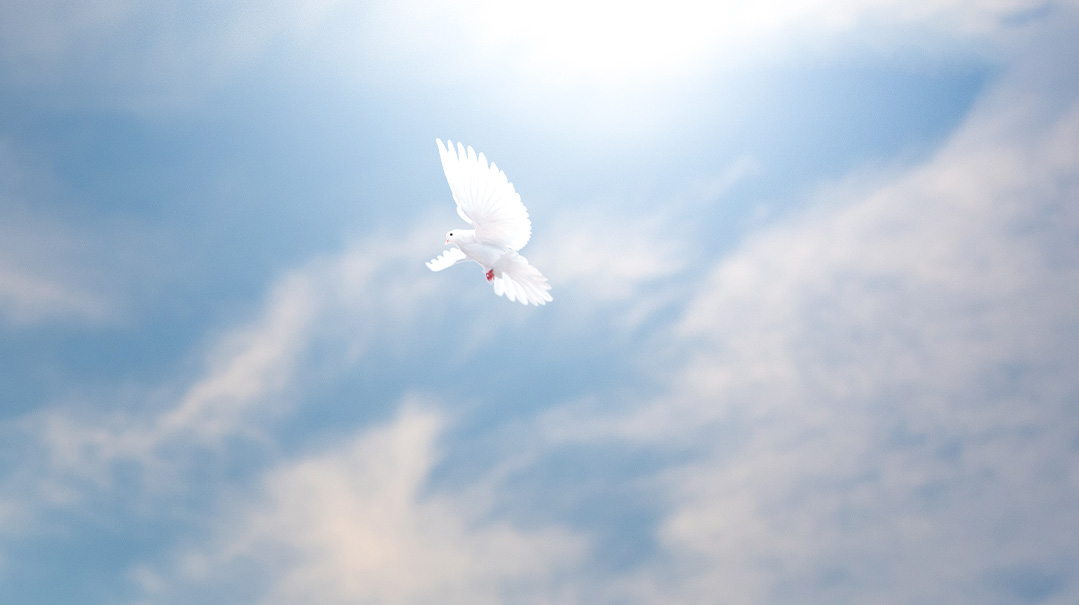Breaking Free

I can’t believe I’m missing your funeral. I can’t believe you’re having a funeral. I can’t believe I didn’t get to say goodbye

C
hayala, I can’t believe I’m missing your levayah.
I’m in a tin tube hurtling through the sky at 500 miles an hour as we speed away from Eretz Yisrael, heading to New York.
Thirty-six thousand feet above land, peeking through the clouds, I see a sprawling topography below me. Ocean. Mountain ranges. Swatches of green earth dotted brown and black, with city lights and highways and millions of people filling doll-sized houses and cars, going to work and school and stores. And your levayah.
I can’t believe I’m missing your funeral. I can’t believe you’re having a funeral. I can’t believe I didn’t get to say goodbye. And now I never will.
The Friday before your petirah, I was a wreck, a lump in my throat threatening to choke me, fighting back tears all day long. I didn’t know why — was it your hospitalization or was I using that as a convenient excuse to cloak my homesickness and nerves? I’d like to say it was a premonition, but let’s be honest; I always fear the worst.
Shabbos came and my fears dispelled. I was calm, distracted, happy. Shalosh Seudos stretched late since we had guests, and after bentshing I said Hamavdil, then hurried to check my messages. I heard Huvi’s message from before Shabbos — no change, everything the same, we’ll all be together for Shabbos — and shrugged, then returned, calm, to the dining room
On Motzaei Shabbos I worked late, then looked at the clock. 12:45. Shabbos was almost over in New York, may as well wait up for an update. When Shabbos was over, I texted. Any news?
Then, 15 minutes later, the phone rang. 1:23 a.m. This can’t be good this can’t be good but no it’s fine, it’s not late, they know I’m still up, I just messaged them.
I called back and Ima picked up, asked me how Shabbos was and if we’d enjoyed our guests and if I’d managed to catch up on sleep. Then she told me that Abba wanted to talk to me, and it was as if a shutter rolled down over the part of my brain that could process the truth.
Every time you were hospitalized, Chay, this was my worst fear. My mind would race ahead, imagining the worst, almost picturing your — before snapping back. Closed. No. We don’t go here. And now, again, I willfully shuttered that part of my mind.
Abba took the phone. “I have something to tell you… it’s not good.”
What happened? What happened? I was not going to go there. It couldn’t be.
“It’s not good.”
Then Abba told me. And I don’t remember much of what happened next. It’s all a blur. I remember waking Yisroel Yaakov and mouthing Baruch Dayan Ha’emes as I pointed at the phone. He sat up, eyes wide in confusion. I remember the phone being passed around among our sisters and all of them just sobbing incoherently into the speaker.
Ima asked me what I thought, if you should be buried here in Eretz Yisrael or in the United States, and I swallowed. I so desperately wanted your kever to be here in Eretz Yisrael, where you were born. And, I thought, hadn’t you undergone enough physical suffering in your life? When Mashiach comes, shouldn’t you be here, able to escape the pain that precedes techiyas hameisim? But I kept quiet. How could I tell a parent where to bury her child?
The rest of the night is a hazy fog. Of phone calls and texts and decisions. Our cousin Meir goes to our uncle’s house and pounds on his door until he finally awakens, so that he can advise us about the horrible decisions no one should have to make. I book tickets and decide when to leave. There is no way I’ll make it for the levayah, which will be held before shkiah, so I’ll have enough time to tell the kids.
Tell the kids. We need to tell the kids. Chanaliza tells me what Shragie said — everyone has a mission in This World, and on Shabbos you’d finished fulfilling yours — and I practice the sentence, simple and short, but still my voice cracks halfway through and I cannot finish.
I go to the airport and wonder if anyone will ask me about my ticket, purchased hours before, my one carry-on (not much luggage to bring when you can’t change your clothing), hoping someone, anyone will ask. But no one does. Maybe short women in snoods don’t look much like terrorists. Maybe my tearstained cheeks tell the story. Maybe no one cares.
And now I’m on the plane, so high above those tiny houses and cars and streets filled with people.
And your levayah. I can’t believe I’m missing your levayah.
Over the course of shivah, we talk and tell stories, the same ones over and over again.
How when you were a few months old, the doctors said you were blind because your eyes weren’t tracking properly. How it was a Friday, but Abba went straight to Bnei Brak to get a brachah from the Steipler, not sure he’d even make it back on time for Shabbos. How frustrating it was when the Steipler didn’t respond to the content in the note, didn’t give him a brachah, just yelled at him not to operate. No one had suggested surgery.
How a few months later, the doctors realized that while you were not blind, you had more extensive disabilities. How a scan indicated that your developmental delays were due to hydrocephalus, and the doctors wanted to put in a shunt, which they described as a fairly common, simple procedure.
How Ima and Abba called a hospital in the US, where doctors told them they couldn’t tell them if it was an emergency, but they’d better not waste any time. How they started packing, throwing all their belongings into suitcases for an emergency flight. How at 2 a.m., Abba shook himself. How could they rush to America for surgery, when the Steipler had told them not to operate?
How it was a few hours before the flight, but Abba jumped into a taxi to Bnei Brak. The Steipler was learning on his mirpeset, and a hoizbochur answered Abba’s frantic knocks. The bochur came with him to the Steipler, where Abba presented his question. The doctors say there’s water on my baby’s brain. Should we operate?
The Steipler looked at him. “I don’t see any water on the brain. Get a second opinion.”
And so you and Abba and Ima left Eretz Yisrael and flew to Columbia Hospital, where the doctors looked at you and said this was a misdiagnosis, and scans confirmed that there wasn’t and hadn’t been fluid on your brain.
But even though the surgery was unnecessary, by now you were back in America, and Abba and Ima ended up out of town, where they were able to do so much — teaching, hosting, kiruv, bringing hundreds of people back to Yiddishkeit.
We talk about the awful Friday night of your petirah, how Hashem in His kindness arranged for so much of our family to spend Shabbos in the hospital with you, even though no one had thought your condition was serious. (“In retrospect,” Rena quipped, “maybe that should have gotten us nervous.”)
How Abba made Kiddush, then Ima realized that things were terribly, terribly wrong. How Abba and Ima talked with you, sang to you, said Shema with you. But no Vidui. You’d lived on this earth for 35 years, Chay, and you were leaving it without anything to say Vidui for.
Those were the dramatic stories.
There were also the quieter stories, a million small details woven into the warp and weft of our life. Your cerebral palsy left you entirely dependent — you had a trach, couldn’t control your hands, couldn’t talk — but you weren’t our special sister, you weren’t even The Special Sister Whose Pure and Simple Neshamah Transformed Us All. You were just one of us. And just like Huvi hated salad and Chanaliza longed for a pet mouse and Yisroel played air guitar, you drank your soda in syringes we squirted into your mouth, pretending we were shooting hoops, and you laughed at our friends and our conversations as much as we did.
When it snowed we brought snow inside in a basin for you to play with. You loved Avraham Fried’s “Mashiach.” You were crowned best new camper your first summer in HASC. You cried when you were sad or lonely. You had a great sense of humor and fun — yes, sprinkled with an appreciation for the classic family sarcasm.
We’d try to figure out what you wanted by asking binary-choice questions, spreading our hands far apart so that you could look to the side that would indicate your answer. Do you want to stay inside or go out, listen to Miami Boys Choir or MBD? Sometimes we’d switch sides to see if you’d look to the opposite direction, still making the same selection, or if you’d keep your head pointed in the same direction; maybe that position was just easier for you. And sometimes you would keep your head fixed in its position — before you wanted to go outside, now you wanted to stay in — but before we could try to help you move your head, you’d break out into a huge grin, your eyes sparkling. Isn’t this funny?
Everyone talks about your smile, how it lit up rooms, how it characterized you. It’s all too easy to assume your smile was a simple one, born of lack of understanding or choice. But that’s not true. Your smiles weren’t robotic, your emotions not simplistic. You were sad at times, scared at others. You were often bored. I remember Ima worrying (when she didn’t realize I was eavesdropping, probably) that you were depressed after you got your trach. You knew the full gamut of human emotions.
Yet time and time again you pushed yourself. They came to visit. Smile. When we Skyped and my kids jabbered on, telling long-winded stories about crafts you couldn’t see, or maybe shoved each other, jockeying for the best position near the webcam, or covering it with their fingers and laughing, because what could be funnier, you’d space out sometimes, probably bored. (It’s okay — I get bored, too.) But then I’d call your name, or they would, and I could see you force yourself to smile at a kid’s project or my bad joke.
And of course there was the time — another one of those shivah stories that we repeated too often — that you were in Nyack Hospital for weeks on end, where you grew pale and gaunt and drawn as the months passed. Dina flew in to visit, and when she walked in, she saw a tear rolling down your cheek and was stricken. “Oh no, Chayala, you can’t cry! If you cry, I’m going to cry.” And you looked at her and forced your lips upward. Smile.
It’s easy to remember that smile, but harder to summon it up in the days and weeks that follow your petirah. I always thought grief was some sort of intangible emotion, like excitement or surprise. I didn’t know that it was a living being that dogs your footsteps, pounces on your chest, winds itself around your throat so that you wake up at night, choking, gasping for breath.
I didn’t know that it follows you around, consumes you, so that it is the only thing you can think of and you find yourself biting your tongue as you pay at the grocery so that you don’t say, “Can I have two loaves of bread? My sister died,” or tell the Egged driver, as you swipe your Rav-Kav, “Thank you. Because my sister died, you know.” But it seems wrong not to tell them, because shouldn’t they know that something is so terribly wrong?
I didn’t know that grief is so small that it can slip through any crack, so that if you just let your mental guard down for a second, all of a sudden you’re crying on the bus to work, hoping your teenage neighbor doesn’t see you.
I didn’t know how long it lasts, that you walk around raw and battered, so much longer than makes sense. Or longer than people’s attention spans, anyway, so you find yourself ferociously blinking back the tears as you choose zucchini, hoping no one will ask why you’re crying, why are you crying, who cries in the supermarket months after their sister dies, but also hoping someone will notice and someone will ask, because shouldn’t they know that the world has shifted off its axis?
It’s too easy, when talking to you, when talking about you, to make it all about me. I’ve gone back to edit this, and backspace and delete, because so much of this was about me: my grief, my feelings. It was easy, really, to transpose our emotions onto you. You never talked, never walked. But you were there. You weren’t passive. You actively chose to listen.
In the days and weeks after your petirah, I searched for a kabbalah to take on in your memory. I wanted it to befit you, to commemorate a trait you’d excelled in. And I also wanted it to be something that would stick.
I didn’t want my resolve to evaporate when the grief faded, I didn’t want an amorphous resolution that would melt into the busyness of day-to-day life. Like every shiur I’ve heard about kabbalos has advised, I wanted specific, concrete, tangible.
Nothing fit.
And then it hit me.
Of course nothing fit. What tangible thing could you be tied down to? You couldn’t talk or walk or control your hands, you couldn’t eat or drink or whisper words of tefillah.
Yet somehow, your resolve did not evaporate in a nebulous puff of willpower. You sat there, every day, and pushed yourself. Fight. Listen. Live. Smile.
Blessed as I am with abundant gifts and abilities, I still cling to boundaries for safety, still need constraints to compel me.
And in a life defined by limits, Chayala, you were able to break through them and soar.
I love you, Chay. I miss you.
L’ilui nishmas Chaya bas ybl”c Rav Zvi Yosef, whose yahrtzeit is 14 Teves.
(Originally featured in Family First, Issue 825)
Oops! We could not locate your form.






